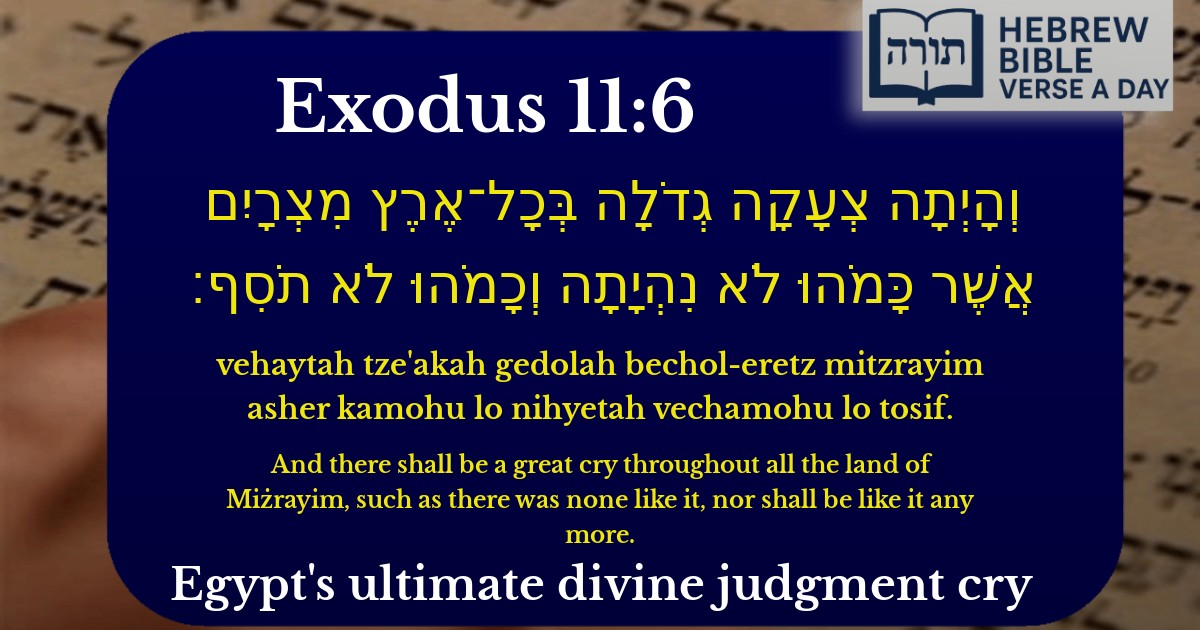Join Our Newsletter To Be Informed When New Videos Are Posted
Join the thousands of fellow Studends who rely on our videos to learn how to read the bible in Hebrew for free!
Hebrew Text
וְהָיְתָה צְעָקָה גְדֹלָה בְּכָל־אֶרֶץ מִצְרָיִם אֲשֶׁר כָּמֹהוּ לֹא נִהְיָתָה וְכָמֹהוּ לֹא תֹסִף׃
English Translation
And there shall be a great cry throughout all the land of Miżrayim, such as there was none like it, nor shall be like it any more.
Transliteration
Vehaytah tze'akah gedolah bechol-eretz mitzrayim asher kamohu lo nihyetah vechamohu lo tosif.
Hebrew Leining Text
וְהָ֥יְתָ֛ה צְעָקָ֥ה גְדֹלָ֖ה בְּכׇל־אֶ֣רֶץ מִצְרָ֑יִם אֲשֶׁ֤ר כָּמֹ֙הוּ֙ לֹ֣א נִהְיָ֔תָה וְכָמֹ֖הוּ לֹ֥א תֹסִֽף׃
וְהָ֥יְתָ֛ה צְעָקָ֥ה גְדֹלָ֖ה בְּכׇל־אֶ֣רֶץ מִצְרָ֑יִם אֲשֶׁ֤ר כָּמֹ֙הוּ֙ לֹ֣א נִהְיָ֔תָה וְכָמֹ֖הוּ לֹ֥א תֹסִֽף׃
🎵 Listen to leining
Parasha Commentary
📚 Talmud Citations
This verse is not quoted in the Talmud.


Context in the Plagues of Egypt
The verse (Shemot 11:6) describes the impending devastation of the final plague, Makat Bechorot (the Death of the Firstborn), which would bring unparalleled anguish to Egypt. Rashi explains that the phrase "such as there was none like it" emphasizes the unprecedented nature of this plague, surpassing even the previous nine in severity. The Midrash Tanchuma (Bo 7) elaborates that the cry was not only due to the loss of firstborns but also because the Egyptians discovered that their idols and magic were powerless to stop it.
The Nature of the "Great Cry"
Ramban (Nachmanides) notes that the cry was twofold:
Why "Nor Shall Be Like It Any More"?
The Malbim explains that this phrase signifies a unique historical moment—never again would Egypt experience such a total and humiliating defeat. The Talmud (Sanhedrin 39a) adds that even in future calamities, no nation would suffer a plague so clearly directed by divine judgment, distinguishing between Egyptian and Israelite households (Shemot 11:7).
Lessons in Divine Justice
The Sforno highlights that the intensity of the cry reflected the measure-for-measure (middah k'neged middah) punishment for Egypt’s cruelty: just as they oppressed Bnei Yisrael with "a great cry" (Shemot 3:9), their own suffering now mirrored that anguish. The Ohr HaChaim further notes that the term "land of Egypt" includes even the animals and structures, as the plague shattered the natural order, demonstrating Hashem’s absolute sovereignty.